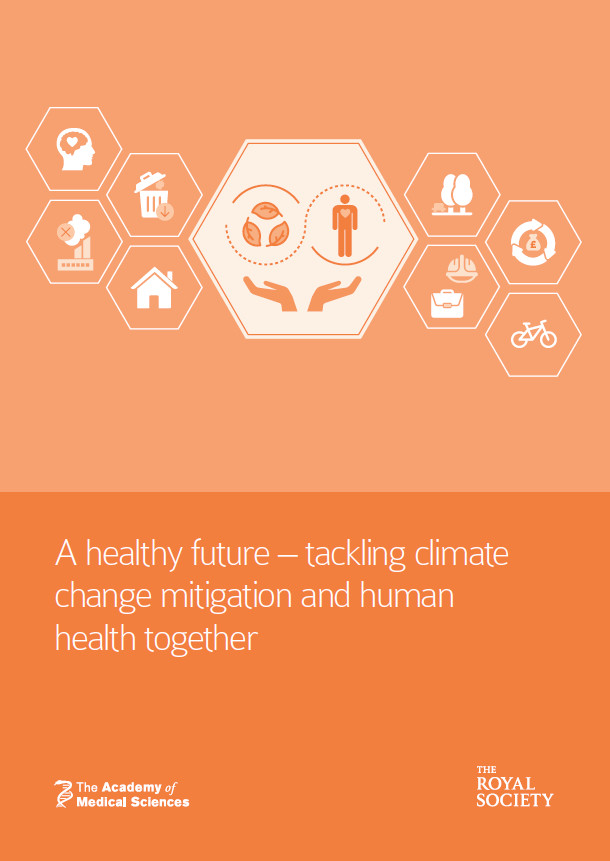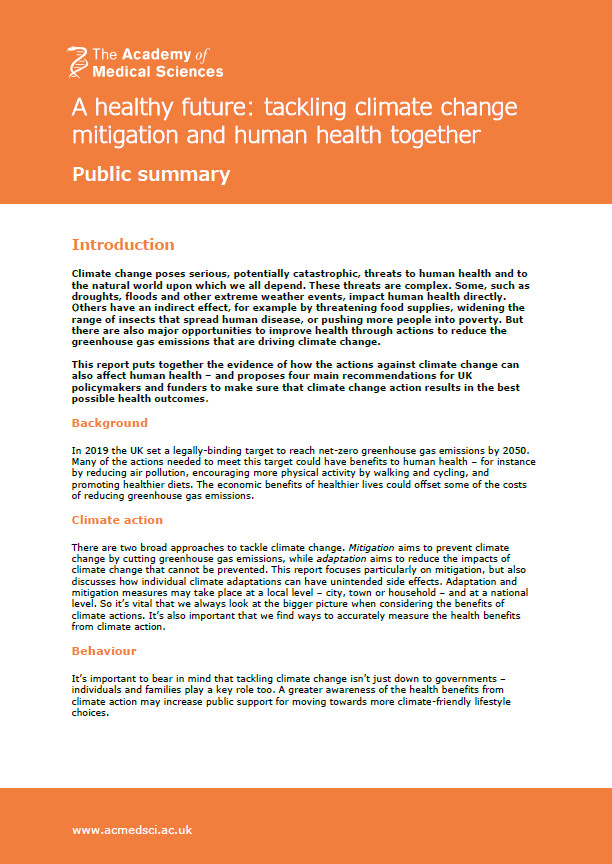Throughout 2021, the Academy of Medical Sciences and the Royal Society undertook a working group project exporing the near-term health benefits of decarbonisation in the UK. The final report was led by 11 experts and informed by a series of roundtable discussions and consultation exercises, resulting in 4 key recommedations.
Download the report.
Consequences for human health resulting from climate change are complex and multi-faceted, including direct and indirect effects, now and in the future. The UK is actively considering policies that reduce carbon emissions to zero, more quickly in the coming decades. Considering the health impacts of such policies is important to ensure we can achieve the greatest health improvement and avoid unitended negative consequences.
This joint project, chaired by Professor Sir Andy Haines FMedSci, and Professor Joanna Haigh CBE FRS explored the health impacts of decarbonisation policies in a number of sectors and areas: energy; food; transport; healthcare; mobility; built environment; employment; and international spillover effects. It aimed to synthesise and quantify the health co-benefits (as well as economic and social benefits) of ‘the most promising’ pathways to decarbonisation. It also highlighted areas where health benefits are larger than the climate change mitigation impact along with potential trade-offs.
The report urges UK policy makers and funders to put health benefits at the heart of climate change discussions, debate and action with four key recommedations:
- Incorporation of health into the climate narrative, with opportunites for the UK Government to take a global leadership role in ensure health benefits are at the heart of climate change discussions, debate and action following it's hosting role of COP26.
- Greater efforts to incorporate mitigation and adaptation measures, to identify and address the
potential unintended consequences of climate action on human health, understand real world implications and maximise health benefits.
- The implementation and refinement of metrics to assess the effects of climate action on health - including its impact on income and other inequalities, to robustly and regularly measure the impact of mitigation policies and minimise any adverse consequences.
- A focus on promoting transdisciplinary systems approaches, including from UK research funders, to address the complex interation of climate change and health.
A series of roundtables centering on cross-cutting themes and consultation exercises took place to inform the report. Summaries of each of the roundtables can be found on the right hand side of this page.
This project will focus on climate change mitigation and the near-term health benefits of decarbonisation in the UK. The project has a broad cross sector remit including economic, social and behavioural aspects. The project will seek to address a number of questions including:
- What is known about how to achieve transformational change i.e. change at the scale and speed that would deliver emission targets consistent with the Paris Agreement
- How can we capitalise on the potential of health co-benefits to accelerate uptake of zero-carbon policies?
- What is the importance of systems approaches to decarbonisation?
The project outcomes will include a report aimed at policymakers, which seeks to influence post-COVID19 and post-Brexit policies and consider health within the green recovery as well as feed into the upcoming UN Climate Change Conference COP26 taking place in the UK in November 2021. The project will also inform the wider international efforts including contributing towards the EASAC European report which forms part of an InterAcademy Partnership project on ‘Climate Change and Health’.
The project was overseen by a multidisciplinary working group with a diverse range of expertise. The working group members were:
Co-chairs
- Professor Joanna Haigh CBE FRS, Distinguished Research Fellow, Faculty of Natural Sciences, Department of Physics, Imperial College London
- Professor Sir Andy Haines FMedSci, Professor Environmental Change and Public Health, London School of Hygiene and Tropical Medicine
Members
- Professor Frans Berkhout, Executive Dean, Faculty of Social Science & Public Policy, Kings College London
- Professor Mike Davies, Professor of Building Physics and Environment, University College London
- Professor Lora Fleming, Director of the European Centre; Chair of Oceans, Epidemiology and Human Health, University of Exeter
- Professor Samuel Fankhauser, Director of the Grantham Research Institute on Climate Change; Director of the ESRC-funded Centre for Climate Change Economics and Policy, London School of Economics
- Professor Frank Kelly FMedSci, Humphrey Battcock Chair in Environment and Health, within the School of Public Health, Imperial College London
- Professor Jennie Macdiarmid, Professor in Sustainable Nutrition and Health, University of Aberdeen
- Professor Dave Reay, Chair in Carbon Management & Education, University of Edinburgh
- Professor Pete Smith FRS FRSE, Chair in Plant & Soil Science, University of Aberdeen
- Professor Lorraine Whitmarsh, Director of the Centre for Climate Change and Social Transformations (CAST), University of Bath
The project convened a series of roundtables centering on cross-cutting themes. Consultation exercises also took place to inform the report. These exercises aimed to synthesise and, where possible, quantify the health co-benefits of pathways to decarbonisation.
Summaries of all three roundtables are available on the right.
The Green Recovery
The first roundtable of the working group project brough together multi-disciplinary experts to explore The Green Recovery. It examined the offer of Green stimulus package, looking broadly across various sectors to explore:
- Specific mitigation policies forming the Green Recovery package, and the potential health benefits and negatives of these activities
- Potential trade-offs for health and wellbeing
- Opportunities to optimise policies to achieve the greatest health benefits
Just and Healthy Transition
The second rountable explored the social and health imperatives of the transition to Net-Zero decarbonisation, aiming to establish the key considerations for ensuring a just, healthy, and equitable transition, and to optimise policies to protect those vulnerable to risk. The discussion focused on employment and the rural and urban built environment through the lens of health implications, co-benefits, negative impacts and mitigation policies.
Behavioural Change
This discussion focused on behaviour change interventions in relation to climate change mitigation and opportunities health co-benefits. It explored the current evidence around the scale of interventions required for maximum benefits, synthesise evidence on some of the existing policies and initiatives impacting behaviour change in this space. It also looked at potential spill-overs in behaviour change across different contexts, and potential co-negative health impacts to consider in regard to behavioural change in this area.
International spillovers and trade-offs
We also undertook a number of expert consultations to explore the international dimensions of health and climate change, with a focus on trade and aid, and the consequences for human and ecosystem health of the transition to net-zero.


